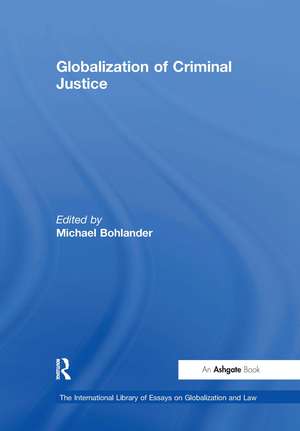Globalization of Criminal Justice: The International Library of Essays on Globalization and Law
Editat de Michael Bohlanderen Limba Engleză Hardback – 26 aug 2010
Preț: 1838.57 lei
Preț vechi: 2469.10 lei
-26% Nou
Puncte Express: 2758
Preț estimativ în valută:
351.81€ • 383.35$ • 296.45£
351.81€ • 383.35$ • 296.45£
Comandă specială
Livrare economică 02-16 aprilie
Doresc să fiu notificat când acest titlu va fi disponibil:
Se trimite...
Preluare comenzi: 021 569.72.76
Specificații
ISBN-13: 9780754628651
ISBN-10: 0754628655
Pagini: 612
Dimensiuni: 174 x 246 mm
Greutate: 1.38 kg
Ediția:1
Editura: Taylor & Francis
Colecția Routledge
Seria The International Library of Essays on Globalization and Law
Locul publicării:Oxford, United Kingdom
ISBN-10: 0754628655
Pagini: 612
Dimensiuni: 174 x 246 mm
Greutate: 1.38 kg
Ediția:1
Editura: Taylor & Francis
Colecția Routledge
Seria The International Library of Essays on Globalization and Law
Locul publicării:Oxford, United Kingdom
Cuprins
Contents: Introduction; Part I Comparative Criminal Law: Harmonic convergence? Constitutional criminal procedure in an international context, Diane Marie Amann; The use of domestic sources as a basis for international criminal law principles, Michael Bohlander and Mark Findlay; The Iranian criminal justice under the Islamization project, Hassan Rezaei; Codifying Shari'a: international norms, legality and the freedom to invent new forms, Paul H. Robinson, Adnan Zulfiqar, Margaret Kammerud, Michael Orchowski, Elizabeth A. Gerlach, Adam L. Pollock, Thomas M. O'Brien, John C. Lin, Tom Stenson, Negar Katirai, J. John Lee and Marc Aaron Melzer; Traversing the rocky road of law reform in conflict and post conflict states: model codes for post conflict criminal justice as a tool of assistance, Vivienne O'Connor. Part II International Criminal Law: Foundations: The philosophy and policy of international criminal justice, M. Cherif Bassiouni; Global criminal justice: an idea whose time has passed, Jeremy Rabkin; Arab and Islamic Shari'a perspectives on the current system of international criminal justice, Adel Maged; Substantive: The expressive capacity of international punishment: the limits of the national law analogy and the potential of international criminal law, Robert D. Sloane; Drawing the boundaries of mens rea in the jurisprudence of the International Criminal Tribunal for the former Yugoslavia, Mohamed Elewa Badar; Prosecutor v. Dusko Tadic: waiting to exhale, Michael Bohlander; Genuine consent to sexual violence under international law, Wolfgang Schomburg and Ines Petersen; Procedural: The structure of international criminal procedure: 'adversarial', 'inquisitorial' or 'mixed', Kai Ambos; The trial proceedings before the ICC, Stefan Kirsch; International criminal tribunals and their power to punish contempt and false testimony, Michael Bohlander; Name Index.
Notă biografică
Michael Bohlander is Professor in the Law School, Durham University, UK
Descriere
This collection of essays evaluates the effectiveness of the process to create an international mechanism for establishing criminal accountability, as happened when the international legal community came together in 1998 to sign the Rome Statute. The articles show the importance of comparative criminal law research to the development of international criminal justice, as well as the foundations, substantive and procedural aspects of international criminal law.





